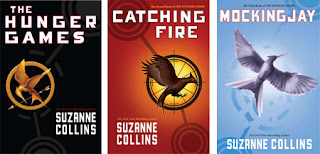I don't plan to go into too much detail where plot points are concerned, as Chassi has already hit the main points in her posts on The Hunger Games and Catching Fire, and I want to save the meat of the Mockingjay review for her since she's the reason I read this series in the first place.
I will echo her sentiment that the world Collins builds in the trilogy is very reminiscent of the world of Lois Lowry's The Giver, which I thoroughly enjoyed. The way Collins plays on the (dis)connectedness of those in the districts and the power and control of those in the Capitol makes for a heart-felt and finely crafted world. My only complaint in this area is the lack of a map, but that just may be the fantasy novel lover inside of me.
 The story itself is extremely compelling, playing on both the action and the emotional aspects and motivations of the characters. In places, it brings in quite a bit of social commentary, which is always a plus in my opinion. My complaint here is the tired trope of so many YA books with female heroines--the woe-is-me, Team Peeta-Team Gale love triangle. A little less focus on that and a little more focus on the social aspects would have served the story well.
The story itself is extremely compelling, playing on both the action and the emotional aspects and motivations of the characters. In places, it brings in quite a bit of social commentary, which is always a plus in my opinion. My complaint here is the tired trope of so many YA books with female heroines--the woe-is-me, Team Peeta-Team Gale love triangle. A little less focus on that and a little more focus on the social aspects would have served the story well.As far as the end of the trilogy, parts of it seemed a bit rushed. At first, I was disappointed in the final chapter of Mockingjay, but the epilogue saved it for me. In fact, the more I reflect on the book, the more I understand why Collins had to end it the way she did.
Overall, this was a great trilogy, especially for young adults, but with plenty to offer for older readers as well.
4.5/5 Stars
--D



